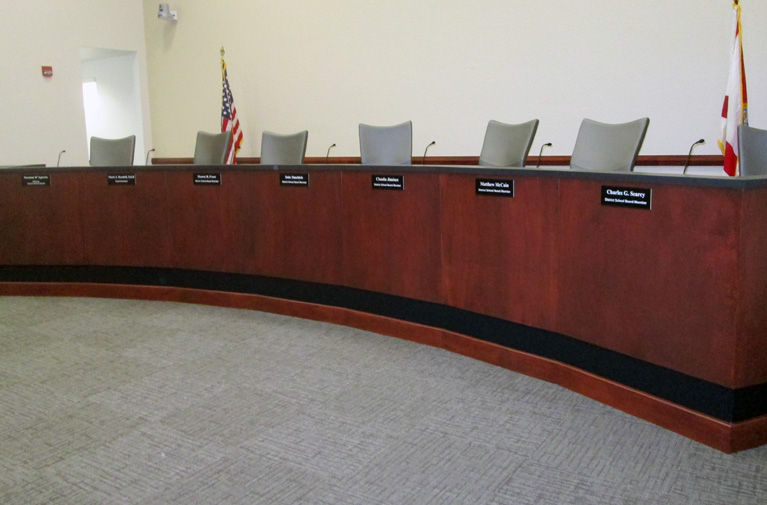
INDIAN RIVER COUNTY — The Indian River County School Board approved a $7.8 million loan that will get help fund school operations until property-tax revenue becomes available in November, with two of the five members voting against the measure.
The loan takes the form of a private placement of tax anticipation notes with a bank. Voting in favor of the financing scheme were Claudia Jimenez, Dale Simchick and Matthew McCain. Shawn Frost and Charles Searcy voted against issuing the tax anticipation notes, which have fee and interest costs that eat up school funds.
Searcy has repeatedly asked why the district has to borrow money. “We pass a balanced budget. I just don’t understand it,” he said.
Tax anticipation notes have been criticized as an end-run around a state constitutional requirement that voters approve any long-term school district debt or future encumbrance of property tax dollars. The state constitutional requirement doesn’t apply to debt carried for less than a year and the current short-term loan will run from Sept. 29 to Jan. 31, 2017.
The district has issued tax anticipation notes in the past, ranging from $12 million to $30 million, but did so on the open market, selling them in batches to individuals and private investors.
This time, Chief Financial Officer Carter Morrison told the board it would be cheaper to place the notes with a bank, saving bond-rating and financial-disclosure costs.
About 30 banks were contacted, with three responding. The best deal was offered by Wells Fargo, which will collect just under 1 percent interest per month. The total cost of issuance, including interest and legal counsel, is nearly $37,000, according to the district.
Robert Auwaerter, a finance expert who recently retired from the Vanguard Group, where he ran a 125-person team responsible for managing $750 billion in assets, addressed the board, questioning its actions.
Auwaerter sought answers to two questions: Why is the district borrowing $7.8 million, when district consultant Ford & Associates estimated the cash-flow deficit at only $1.2 million? Why is the district borrowing the money for 120 days, when tax money will be available to pay off the loan in 45 days? He estimated $22,000 could be saved if $3 million were borrowed for 45 days, which would more than cover the deficit.
“I urge you to question Mr. Morrison,” Auwaerter said to the board. “It is your obligation to taxpayers to explain why you are spending this money.”
Morrison explained the cash-flow analysis only considered the general fund deficit, but other funds are in deficit as well. He did not explain why only partial information was given in the analysis.
Jimenez asked if the loan would cover “challenges” the district is having with the health insurance fund, which has a $7 million deficit. Morrison did not clarify whether the loan will partially pay for the insurance deficit. He merely said it was explained to board members at a meeting Auwaerter didn’t attend.
As far as the borrowing period is concerned, Ford said less than 120 days would have shut down interest in the notes. Two of the banks said they would not have responded to the Request for Proposals if the term limit were shorter, he said.



